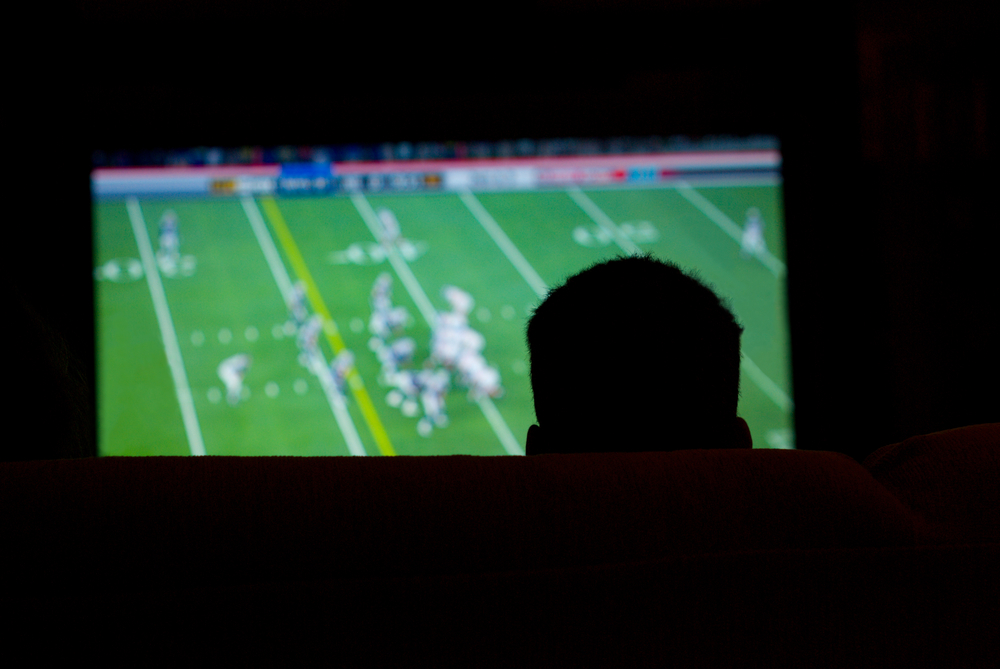
The air chills, the humidity departs, the school bell rings, the shofar blows … all signs that the football season has begun to eat my Sundays. Or would be eating them, if I hadn’t resolved, unlike most Americans (even most women), to opt out of the NFL this year.
I am here to report that I survived my first two NFL-free weekends (spare me the details of the dramatic Chicago-Minnesota finale). It was a strange experience, as if I’d delayed the sun setting for four hours. The rhythm of a fall Sunday—when to exercise, when to clean up the e-mail inbox and, in my case, when to fold laundry—had a gaping hole in it. Without the game to help make those mundane tasks enjoyable, how will they get done?
In fact, I was like an untethered time-management hose. I could work out whenever. I could take the dog to the vet, drive the kid to the afternoon party—even go the grocery store for a single tomato. That’s right, I’m suddenly Mr. Agreeable. A year ago I would have called into question the Family Inventory Management; the recipe’s actual need for tomato; the need to cook our own food; and the need for anyone, ever, to leave the television during the Monumental Game that Could Offer an Early Indication as to Who Might Win the NFC South Four Months From Now. Don’t you understand how insignificant a tomato is when compared to the week one Saints-Falcons saga?
News flash: Watching football is a time-suck. I’ve tried to convince myself that I can be productive during the game. But if there’s a tense sequence (and the play-by-play commentators are paid to make everything seem like a tense sequence), I’m suddenly folding one shirt every 10 minutes. Even when I think I’m saving time by watching on DVR and fast-forwarding through commercials, in fact I’m constantly interrupting my laundry-folding or e-mail-sifting! Studies have shown there’s 11 minutes of action in a game that takes three hours. That’s a lot of wasted time trying to not waste time.
So instead, on Sunday afternoon I cooked dinner—a real dinner, with different dishes and a complicated recipe, involving Heat Other Than A Microwave. I helped the kids with homework, with the attention span to actually help. I found out how the other third lives … the third that doesn’t watch the NFL. It was enjoyable.
But my newfound free time is merely a byproduct of my resolution. Why have I chosen to abstain from pro football? I have four downs’ worth of reasons:
First down: head injuries. The sad tales of retired NFL players who suffer brain trauma from repeated concussions are now legion. Yes, there’s been a new settlement for them—but that $675 million is going to be spread over 60 years and thousands of former players, with another $91 million going to research and medical monitoring. (And this is all just a fraction of one percent of the revenue the league will make in the next two decades.) Plus, the NFL gets to keep the information it’s compiled on brain injuries and football secret. What are they hiding? Should I be watching as entertainment a hazardous activity when its effects on its entertainers are being swept under the turf? I can’t be complicit in this anymore.
Second down: performance-enhancing drugs. Sure, NFL players use some of the same drugs you and I take to recover from injury. But they also rely on substances that are dangerous to them. Performance-enhancing drugs are so rampant now that players who don’t take something are arguably handicapping themselves.
Third down: If the NFL didn’t exist, would college football be so corrupt? And this is where I’ll admit it: My weekends have not been entirely football-free. My daughter is on her high school poms team, so I have a good excuse to catch the Not-Exactly-Friday-Night-Lights atmosphere of the D.C. suburbs. And more importantly, my college alma mater, Northwestern University, once a doormat, is now ranked and romping through their non-conference season. (No. 1 in interceptions! Go ’Cats!)
When I tell my friends I’m not watching the NFL, they say that college football is far worse, because you can add the slavery of uncompensated players and a corruption of academic mission to the head injuries and performance-enhancing drugs. True. But isn’t the NFL responsible for the dynamics of college football? It’s the league that forces players to go to college, essentially turning big-time college leagues into their farm team system and giving the NCAA a cudgel to keep collegiate athletes in line.
(There have been enough headlines this year to tempt me to add a point about off-field violence. But while this type of behavior elicits disgust and horror from just about everyone—especially when an All-Pro is accused of murder, or a Super Bowl hero has a murder trial in his past—the statistics suggest NFL players aren’t more likely to be arrested more often than other men their age, except for on weapons charges. So, give them this one.)
Fourth down: I’m pushing the demand curve in the right direction, just a little. So many of the arguments about the NFL end with a sigh of, “Well, it’s an unstoppable force, so let’s try to fix it rather than end it.” But that feels like surrender. Small actions add up, and you might as well start somewhere. I know my one hybrid car isn’t going to stop global warming, but I’m telling the auto industry that I’m willing to pay extra to help the planet. My refusal to watch the films of child-rapist-fugitive Roman Polanski won’t stop him from making films, but as the father of daughters, I’m not going to help him. We can either surrender to a demand curve, or we can try to make a small difference. Let others sue. Let others rant. I’ll just go for a bike ride on a beautiful fall day.




Send A Letter To the Editors